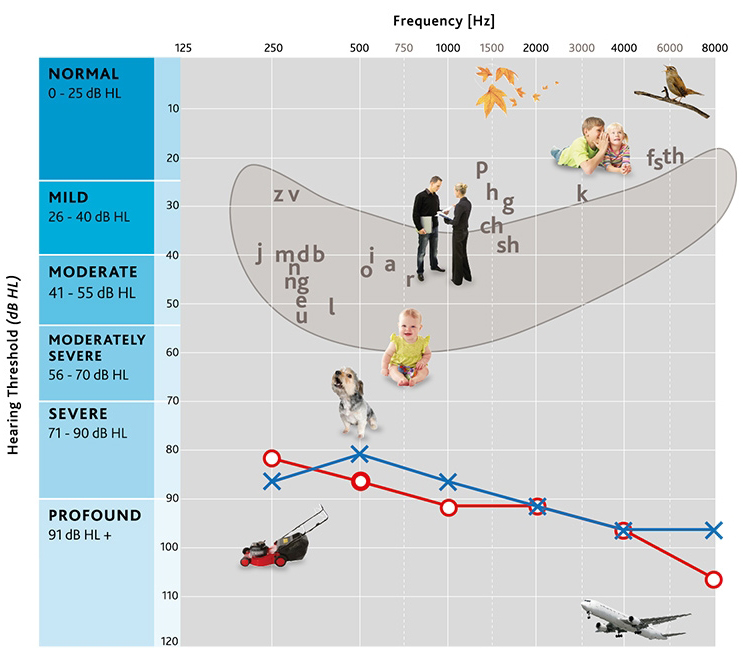Your hearing is as unique as your fingerprint! Many factors determine your ability to hear, such as your professional or recreational exposure to noise, your age, and even medication use. It’s not unusual for individuals to experience a decrease in their hearing ability over time, although untreated hearing loss can be harmful to your overall physical and mental wellbeing. If you are concerned about your hearing loss, we have important information to share.
Perhaps you had a hearing test as a child in school or later as an adult. During a pure tone test, you will listen and respond to the beeps you hear while wearing headphones or earplugs. After the test, you will be given an audiogram that shows your hearing health in each ear. The audiograms below show the results of normal hearing and hearing loss. For normal hearing, the line will be relatively flat in the range of 0 to 20 Decibels (dB). For a person with hearing loss, the steeper the slope of each line (signifying which beeps you did or did not respond to), the greater the degree of hearing loss.
An audiogram doesn’t always reveal everything about your ability to hear. A speech-in-noise test may also be conducted, which requires listening to words in noise and repeating them to better understand how background noise affects your ability to hear and respond appropriately. Visiting a hearing professional for a diagnostic hearing test is our recommendation, particularly for anyone who is 60 years or older. In fact, the World Health Organization recently recommended that all adults, from the age of 50 years should be screened regularly for hearing loss. Screening may be conducted at 5-yearly intervals until the age of 64 years. From 65 years of age, the frequency of screening should be increased to every 1–3 years.
If you are unable or unlikely to schedule a diagnostic hearing test, rapidly advancing technology has made hearing screening available fully online and can provide you with a basic understanding of your hearing health.
If you have a mild hearing loss, that means you can hear most things but struggle to hear sounds between 26-40 decibels (dB).1 For example, it may be hard for you to hear whispers, water dripping, or birds chirping.
With a moderate hearing loss, you struggle to hear sounds between 41-55 dB. This means that phone conversations without a loudspeaker may be difficult, your TV volume may need to be turned up loud, and certain letters such as j, z, g, i, u, b, d, a, o, r, p, ch, sh, h, k may be lost to you.2
With a severe hearing loss, you lose out on sounds between 71-90 db, which may threaten your ability to hear conversation at normal levels, a phone ringing, or your doorbell.
Being unable to hear sounds beyond 91 db signifies a profound hearing loss and speech identification is very difficult or inaudible.

Hearing aids are an option for individuals with any degree of hearing loss. You can find hearing aids through your local hearing care professional with prices that range from less than $1,000 to $4,000. The technology offered today provides quality sound, a comfortable fit, rechargeability, audio streaming and more. For persons with severe to profound hearing loss greater than 55 dB, your treatment should only be provided by a hearing care professional.
If you would like to take the first step toward treatment by getting a hearing test or if you have general questions about your hearing health or what technology is available to you now, be sure to contact a hearing care professional.
1 American Speech-Hearing-Language Association (ASHA). Degrees of Hearing Loss. https://www.asha.org/public/hearing/degree-of-hearing-loss/
2 Bricker, S. (2015, September 10). What sounds would you miss with hearing loss? Starkey. https://www.starkey.com/blog/articles/2015/09/sounds-missed.